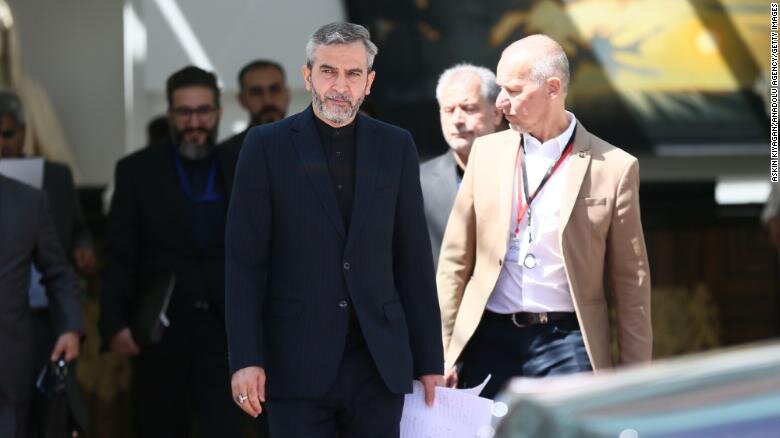Iran’s response to EU is a complete package

TEHRAN— After an extraordinary meeting of the Supreme National Security Council (SNSC) chaired by President Raisi on Monday afternoon, Iran’s top negotiator Ali Bagheri Kani wrapped up Tehran’s final response to the EU proposals.
The Foreign Ministry sent the document to the European Union, a source close to the negotiating team told the Tehran Times early Tuesday.
Meanwhile, ISNA published a news brief quoting a source that Iran expects the U.S. to respond in two days.
The Foreign Ministry did not respond to the Tehran Times call in this regard.
The Tehran Times has learned that Iran’s conclusion is a complete package, regarding the economic guarantees the U.S. must provide to assure Tehran of fully benefitting the Joint Comprehensive Plan of Action (JCPOA).
Tehran has provided an initial response to the EU proposal, made its concerns clear to the U.S. regarding the economic guarantees, and has presented a series of initiatives to the U.S. to allay those concerns.
There is no mention of Iran’s demands that the IAEA should close the political claims regarding the Safeguards probe, the Tehran Times has learned. This was not mentioned by Foreign Minister Hossein Amir Abdollahian as well, when he spoke to the press on Monday.
In his cordial meeting with foreign policy journalists on the occasion of Iran’s National Correspondent Day, Amir Abdollahian did not refer to the closure of the political claims surrounding the Safeguards probe as an obstacle to the JCPOA revival.
“We are exchanging messages with the U.S. on three issues and we will announce our latest comments in the coming days. We told America that if our opinions on these three issues, which are reasonable opinions, are respected, we are ready to enter the stage of announcing an agreement and hold a conclusion meeting with the presence of the foreign ministers in Vienna,” Amir Abdollahian said.
The Tehran Times has learned that Iran’s response to the EU addresses three outstanding issues.
Nour News, a media outlet close to Iran’s SNSC, said on Tuesday that in the ideas proposed by EU foreign policy chief Josep Borrell, who acts as the JCPOA coordinator, some of Iran’s concerns regarding the three main topics of the negotiations have not been clearly answered.
“The opinions expressed to the European Union by Iran also point to the necessity of meeting the legal demands of our country,” it said.
In an interview with Al Jazeera early on Tuesday, Mohammad Marandi, media advisor to the Iranian negotiating team, said that Iran’s concerns are “not difficult to resolve.”
In response to the Tehran Times correspondent, Marandi said, “On Al Jazeera Arabic I said that in its response Iran has expressed its concerns, but that the remaining issues are not very difficult to resolve. Those concerns are founded upon past U.S. and EU violations. I can't say that there will be a deal, but we're closer than we've been before.”
Speculations surrounding Iran’s nuclear package have been raised by certain political pundits. Maybe reading between the lines of the foreign minister’s words can help clear up some confusions.
“In the recent Vienna negotiations, the American side expressed its verbal flexibility on two issues. This should be in writing. On the third issue and guarantees, we must have America's flexibility. If America shows flexibility, we will reach a point of agreement in the coming days,” Amir Abdollahian told the press on Monday.
EU spokesperson Nabila Massrali confirmed to IRNA that the EU has received Iran’s package proposal, and has shared it with the United States.
“We are studying it and are consulting with the other JCPOA participants and the U.S. on the way ahead,” Massrali told IRNA.
A U.S. State Department official confirmed that it has received Iran’s proposal.
The EU seems to be satisfied with Iran’s response, as a Western diplomat told Politico that “Nothing too inflammatory (is) in there.”
It is also important to note that Iran’s response came after Qatar Assistant Foreign Minister for Regional Affairs Dr. Mohammed bin Abdulaziz Al-Khulaifi met with Amir Abdollahian and Bagheri Kani in Tehran on Saturday, delivering a written message from the Qatari Foreign Minister Sheikh Mohammad Abdulrahman bin Al Thani.
Al-Khulaifi then held a phone call with International Atomic Energy Agency (IAEA) Director General Rafael Grossi on Sunday. The IAEA director general has been quiet ever since. It is not yet clear if Iran has dropped the demand or has postponed it to be discussed after the JCPOA revival. However, reading between the lines of the words of Iran’s top diplomat saying that the nature of negotiations is about give and take, it can be assumed that Iran has dropped the demand.
“I was in the Majlis (Parliament) last week and they said that they saw the draft and it has flaws, but I will say from now on that if we reach an agreement tomorrow, if someone carefully goes over the text, the text we wrote will have flaws, but the flaws come from the fact that our opposite side of the negotiations also has demands. We cannot say that what you say is not true and your words are not acceptable to us. The text we have may have the same flaws as the JCPOA. This is due to the nature of negotiation,” he said on Monday.
However, in a Tuesday afternoon interview with CNN, Marandi shed some new light on Iran’s proposal. He told CNN that Iran is looking for guarantees that if a future U.S. administration withdraws from the deal the U.S. will “have to pay a price.”
In line with Marandi’s revelation, a regional diplomat briefed on the negotiations confirmed to CNN that “The main issue facing the revival of the deal is the guarantees requested from the Iranian side ensuring Iran will be compensated in case future U.S. Administrations decide to withdraw again from the deal.”
Basically, Iran is requesting to be compensated if a future U.S. president withdraws from the agreement.
Leave a Comment